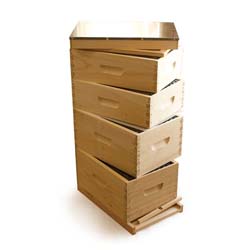Five Tips to Surviving While Wondering about your Bees’ Survival
As tough as it is for honey bees in winter, it sometimes feels harder to be the human waiting to see how they did. Where I live, the snow sometimes feels like it takes forever to melt. Last year, we had 30 inches of snow in one storm! And I don’t think it all disappeared from the yard until April.
To cope with the dark, cold, bee-less days and nights, I’ve come up with a few strategies so I can be sure I still have my sanity intact when spring does finally arrive.
1. Read
One of my favorite things to do in the winter is to read. Reading books about bees, other beekeeping methods, etc. not only keeps me from missing the bees too much, it also makes me a better beekeeper. Some of my favorites include:
- The Thinking Beekeeper: This book provides a tremendous introduction to Top Bar Beekeeping and a process for keeping bees in top bar hives.
- The Barefoot Beekeeper: A well-written and insightful book about keeping bees naturally, since organically is all but impossible – and you’ll learn why that is the case!
- Honeybee Democracy: A bit technical, but a fabulous book about how honeybee hives communicate with their hive mates and make decisions as a unit.
- Natural Beekeeping: Another resource on chemical free beekeeping methods by an industry expert, this book also explains the harm chemicals cause bees.
- Natural Beekeeping with the Warre Hive: Aame context as above, but this one includes methodologies for Warre hive users.
- On my list to purchase since it’s still “pre-release” Advanced Top Bar Beekeeping: While not due to be released until May 2016, I’m highly anticipating this book as the sequel to The Thinking Beekeeper mentioned above.
- And, being slightly biased as we are, we’d be remiss to not mention the PerfectBee eBook Series, our 3-step plan to your first beehive.
2. Plan
Whether your bees survive the winter or not, you’re going to need a plan for the spring. Any protection in and around the hive will have to be removed and appropriately stored. If you’re like me and wait to harvest honey until spring, you’re going to need a plan, and the necessary equipment, for extracting and storing the honey.
If you’re lucky enough that the bees survive the winter, part of your plan should include if/when you may need to supplement their food supply. Spring blooms are wonderful for bees, but also often in short supply, so they may need some extra help the first few weeks. Be aware of what’s blooming nearby, and when. I typically need to supplement through mid- to late May when things really start popping.
If you’re not so lucky, you’ll need a plan about when/where you’re going to purchase new bees and a method or methods of assessing what may have gone wrong – learn from that and try something else the following winter.
3. Inspire Others
One of the best ways we can help bees is to share our stories and inspire others to want to help them too. The winter doldrums are a perfect time to do this. Talk with people, post on social media, write, draw, paint, etc. and share your creations. Anything you do that engages others on the topic of bees has the potential to ignite a fire in them and give rise to another beekeeper.
Yes, we should be sharing all of that during the year as we check our hives and learn from our bees, but we’re all busy and it doesn’t always happen. Saving some for winter and sharing it as we miss our bees helps us miss them less and grabs people when they have more time and attention to give the topic.
4. Get Inspired
Whether it’s talking with other beekeepers, reading books, or watching movies or documentaries, find something that keeps you excited about beekeeping. On some level, it is a calling, one that can be hard to maintain during the winter blahs. It’s important to find things that keep us inspired and passionate about beekeeping.
I adore the movie Queen of the Sun. It keeps me inspired and I feel like I learn something new each time I watch it. If you can, share the things you’re doing to stay inspired with your friends and family. You never know, it might inspire them too (and you’ll be able to check #3 off your list!)
5. Practice Patience
Winter is often long and stressful, but it is also temporary. Breathe and know deep in your soul that it will end. The days will get longer and warmer. The snow will melt. Honey bees in winter often find a way, against the odds, to reach the spring as a colony. The bees will emerge in glorious flight again. Keeping our minds and bodies active will help the time to pass more quickly, but even if we don’t, the winter will always end.
These are just a few suggestions, based on things that help me. I’m sure there are others I haven’t thought of. What do you do to ward of the winter blues and anxiety about your bees’ survival? Let me know in the comments section below.
